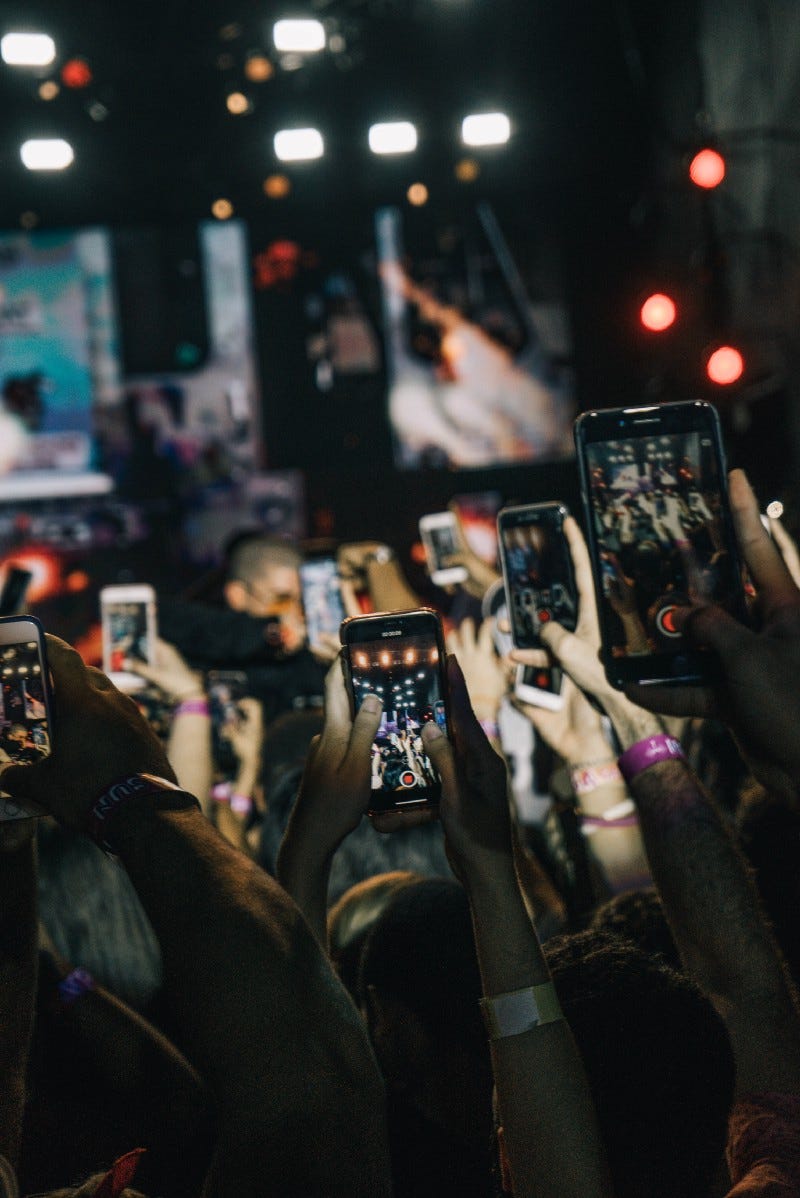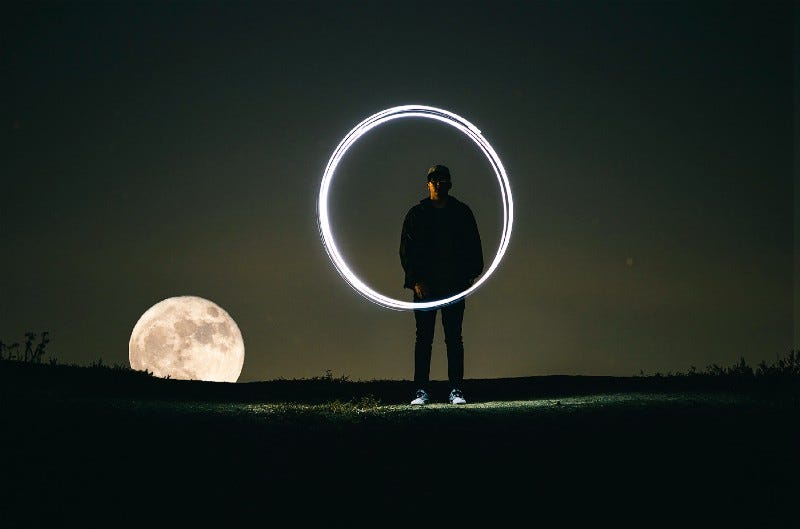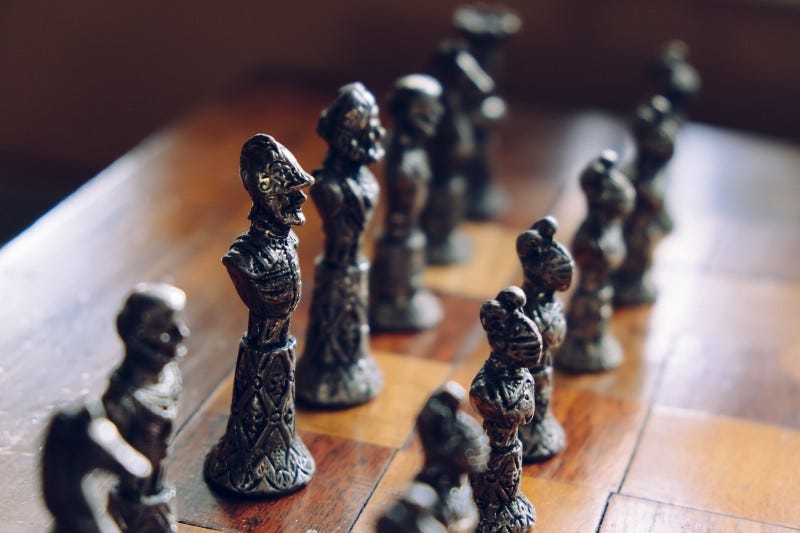Love the Art, Hate the Artist?
Is it possible to judge a piece of work apart from the person who created it? If not, what do we do about it?
Well, that was a long gap. I’d love to say I spent the time attaining enlightenment on Mt. Ararat, but “irritating health issues and various urgent things that needed my attention” is a more honest account of events. Hoping to get back into some sort of regular schedule from here on out, but who can predict the future? Anyway, good to be back.
This post is about the separating-the-artist-from-the-art dilemma. There aren’t any easy answers on this one, but I believe that with most thorny questions in life the point isn’t to definitively answer them so much as keep reformulating them until the issue has more of a sense of spaciousness than before. I find this loosens the grip of habitual thoughts and emotions and helps the mind to approach the subject in a more relaxed way. So my dialogue here takes in morality, metaphysics, celebrity, the purpose of punishment, the nature of art — anything that helps me create space around a topic that too often gets discussed along narrow lines.
The post’s written in a bouncy style, but I’d like to stress that I see a distinction between taking a light touch with something and making light of it. For every Twitter-storm-in-a-teacup there’s a famous person who’s unambiguously damaged an awful lot of people, and the fact that celebrity provides a mechanism for magnifying and enabling the dark side of human nature is always going to be troubling.

‘My favourite actor just did something bad.’
‘How bad? Never want to watch their stuff again bad?’
‘Yes, that bad.’
‘I take it from the fact that they’re your favourite actor that you’d like to keep watching their stuff, but I take it from your concern over their behaviour that you’d also like to not keep watching it.’
‘Was that sentence really necessary?’
‘So when did they do the bad thing?’
‘Well, five years ago, but it’s just come to light. Of course, that’s only the incident we know about. They may have done lots of other bad things.’
‘Then again, so might anyone else.’
‘True. But it’s more likely that this person has, because we already know they did one bad thing. That makes them the Type of Person Who Does Bad Things.’
‘Maybe celebrities in general are the Type of People Who Do Bad Things. We’re often shocked when we find out a famous actor has done something bad, but aren’t they way more likely to than the average person? All that fame, wealth, talent, emotional volatility and ego, not to mention levels of opportunity, temptation and unaccountability a normal person can’t imagine. The latter is probably less true now than it used to be when Keith Moon was at large, but still.’
‘Your point being?’
‘I dunno. I just find it interesting that we have to say “innocent till proven guilty” in a courtroom, but we choose to take the same approach in the rest of our lives, whether we’re encountering someone in person or online, socially or through their work. Instead of playing the probability game — “How likely is it that you’re as nice as you seem?” — we say “I’ll take you as I find you until I hear different.”’
‘Which often leads us into trouble.’
‘Absolutely. Then again, unearned trust has its uses as well, and it’d be hard for society to function without it. And that’s before you get to the question of where you draw the line between “good” and “bad” people, or how much someone’s private bad behaviour is your business if you only know them through work or…’
‘Can we get back to my favourite actor?’
‘OK. So your favourite actor did a bad thing five years ago. Are you a fan of any of their roles from the last five years?’
‘Not particularly, they did their best work in the early days.’
‘So you could look at it this way: the version of the actor that you like the most did nothing wrong. As far as you know anyway. The younger them is temporally pure, the same way a baby is perfectly innocent until they grow up to be a serial killer. If you want to boycott your favourite actor’s material, why not leave it at their films from the last five years?’
‘I’d still be giving the present version of them my money.’
‘You could pirate everything. Although of course that also affects everyone else who worked on the productions.’
‘But don’t you feel like a bad deed stretches back into someone’s past as well as their future? It taints everything.’
‘Isn’t judging previous versions of someone for a future misdeed the same as judging someone for something they haven’t done? If a bad deed taints the doer, doesn’t it do so purely in the moment they’re doing it? Beforehand they haven’t done anything wrong, and afterwards they’re not doing anything wrong any more. The connection between what people do and what they are is a very ambiguous one.’
‘But we all intuitively feel that the sinner puts themselves into a state of sin, at least until they make amends.’
‘True, which is why the mechanisms of repentance, atonement and forgiveness are so important. But the mechanisms stall between celebrities and their fans for a thousand reasons: the public aren’t the ones who were wronged but we still get apologised to, there’s no way for concrete amends to be made to us, we don’t know the wrongdoer personally so we’ve no way to judge the quality of their repentance, all their words are filtered through intermediaries and artificial-bordering-on-surreal media environments…’

‘To me the issue is that a bad deed shows who you are and always were. It’s the only window into someone’s true character you need. My favourite actor had the bad deed in them from the start, they just didn’t have the opportunity to act on it until the circumstances aligned.’
‘But you could say the same thing about you and me. Or about people who never do bad deeds, simply because they’re never pushed hard enough. Don’t most of us contain horrific actions that are just waiting for the right circumstances to manifest themselves?’
‘I’ll grant you that we all contain the potential for evil. You or I might have been Nazi prison guards if we were born in the right time and place. But the people I judge are the people who aren’t thrust into extreme scenarios and mess up anyway. There was no pressing reason for my favourite actor to do what they did.’
‘They might feel differently. I think a lot of evil is committed because the person has a blind spot and genuinely doesn’t realise how bad their actions are — they’ve no outside perspective on them. Alternatively, they know they’re in the wrong but their brains exert an unrelenting pressure on them to act badly anyway. Some people’s internal pressures are as hard to resist as the external pressures that drive people to rat out their neighbours in evil regimes.’
‘Meanwhile, other people are good through and through.’
‘I doubt people achieve that level of purity without decades of inner work, if even then. And if they do, aren’t they just genetically lucky, same as you’re lucky if you’re born in a time and place that doesn’t pressure you to rat out your neighbour to a dictator? Isn’t your personality down to the luck of the draw just as much as your environment?’
‘But you have the ability to transcend your personality. We don’t expect that of toddlers, but we do of adults. Some people put the effort in, others don’t. It’s a matter of willpower.’
‘Right. But is your willpower something separate from the rest of you, or is it just as much a matter of genetic luck as your looks, abilities and disposition? Even if it’s fundamentally a non-physical thing, a property of the soul, your willpower seems very — well — acted upon by your brain, body and surroundings. If we can pull ourselves above those pressures and influences at all, I’d argue it’s only to some extent, some of the time.’
‘What this boils down to is you’re saying you would have done the same bad thing as my favourite actor if you were in their position.’
‘Probably, because being in their position doesn’t just mean being physically in the same spot, it means having all their past history and psychological problems — basically being them. You’d have to do the same thing they did if you were them, because they were them and they did it.’
‘Maybe, maybe not. As you say, depends on how free free will is.’
‘Right. Incidentally, I sometimes wonder if free will is truly free even if it belongs to the soul more than the brain. Is something free just because it’s non-physical?’
‘You know what, that sounds like one of those unanswerable questions that tie you up in metaphysical knots rather than addressing the point at hand. So why don’t we get back to my favourite actor.’
‘The trouble is that it’s impossible for us to know how to judge wrongdoing without answering all these unanswerable questions. And yes, that ties society up in knots — how could it not?’
‘Does it though? Society basically takes the same approach to public wrongdoing now that it always did: “No matter how much or little you can be metaphysically blamed for this, no matter how much we can or can’t judge you as a person, no matter whether your victims forgive you or not, you’re going to be disciplined for it, either by the state or by private enterprise.”’
‘As far as I’m concerned, official punishment isn’t a matter of expressing our displeasure with someone or exacting retribution, but simply a way of protecting the community from harm. It’s primarily a deterrent: if actions didn’t have consequences then more people would do bad things. Punishing someone also protects society from potential future misbehaviour from the person themselves: if they’re in jail or fired their freedom to harm others is limited. They may also be forced to reckon with why society has such a problem with them, and work on harming others less.’
‘So for you punishment is more future- than past-oriented.’
‘Exactly. Incidentally, for all that cancel culture and accountability are buzzwords at the moment, society remains far less punitive now than at most other times in history. At least in terms of actual physical repercussions. Our attitude to famous actors and musicians today seems harsh compared to the laissez faire approach of the ’60s and ’70s, but the way famous artists got away with murder — almost literally — back then was an anomaly, not the historical norm.’
‘Depends on what type of wrongdoing you’re talking about of course. We take some things more seriously than any previous society I can think of — usually stuff you can’t actually be arrested for, stuff you think, feel and say. Not that punishing people for thoughts, feelings and words is new, we just penalize different ones now.’
‘In some strange sense we’re very punitive and very laissez faire today, all at once. Some people suffer immense professional and personal damage for the most ridiculous non-infractions, while others go uninvestigated over the most serious allegations. Is your favourite actor facing any serious repercussions, by the way?’
‘Doesn’t look like it.’
‘Hmm. So the only question is how you’re going to handle the situation.’
‘Kind of why we’re having this conversation in the first place.’

‘So what’s the main issue for you? Why exactly do you want to stop watching the movies?’
‘It’s fundamentally an emotional thing, I suppose. I associate my favourite actor with the thing they did. I see their classic performances in a new light — why did they pick that role, what were they drawing on? I look at their face and I feel bad. I feel betrayed because I thought better of them. And I’m not in the mood to hear that my feelings are my own problem.’
‘I’d never say that. I mean, obviously feelings about people you don’t personally know are influenced by a lot of extra-moral factors, time in particular. Not many people today care that Caravaggio was a murderer or that Shakespeare hoarded food during a plague — it all happened so long ago and no-one alive today is still impacted by it. It’s just hard to feel betrayed by someone that a vast temporal gulf has prevented you from feeling that close to in the first place.’
‘Right.’
‘But the way feelings are conditioned doesn’t make them “irrational” or “invalid”. They are what they are. And something I rarely see people admit in this whole debate is that when you connect with someone’s work you are connecting with them as well. Profoundly. That’s why artists take criticism so hard: they’re not just showing you what they do, they’re laying some important aspect of themselves bare. Truly great work does come from a deep wellspring of emotion and insight, and it does carry the stamp of someone’s personality. Always.’
‘I’ve always felt silly saying that I feel connected to my favourite actor. But I do. I feel like every role shows me a different facet of them, even though they’re putting on someone else’s clothes and saying someone else’s lines.’
‘I think that’s exactly what’s happening. Robert De Niro isn’t literally Travis Bickle or Jake LaMotta, but there’s a reason only he could have played them. So is it any wonder we turn from artistic appreciators into personal fans? When you encounter layer after layer of meaning and emotion in someone’s body of work, you are getting to know them as a person. But only a few carefully chosen sides of them. And only in a way. Everything’s refracted and distorted — filtered through the artist’s evasions and technical limitations, then filtered again through the psychological makeup of the fan, whose reaction to the artwork is conditioned by their own personality just as much as by the instincts of the creator, if not more.’
‘Which is why most artists get prickly when people read too much biography into their art. There’s a fascinating duality here — the compulsion to reveal and express versus the compulsion to hide and keep private. Healthy and necessary impulses both. Bob Dylan slaps down anyone who tries to read specific meanings into his songs, but he also says “A poem is a naked person” and “The people in my songs are all me”.’
‘And that’s where the trouble starts. You can’t separate the artist from the art, not when you really love the art. Because the art is a vehicle for the artist to show you all the most colourful, beautiful and fascinating things about themselves. Often things they feel utterly unable to express in the rest of their lives. But unfortunately these people have mundane, petty, stupid and evil sides too, and they’re not showing you much about those.’

‘And when you’re forced to find out about them it can’t help but come as a shock. It’s similar to falling in love from a distance, then rapidly falling out of it again from a distance once you know more. You’re responding to everything that’s genuinely exciting about someone, adding your own hormones to the equation, then discovering that things are more complex than you thought.’
‘And the worst part? The people who are most extreme in one way tend to be the most extreme in all the others too. So the more beautiful, rich, wild and moving someone’s best art is, the likelier they are to have a correspondingly large shadow lurking behind it. We experience the light and the shadow as a contradiction, but in reality they complement each other. And honestly, it sounds glib to say it, but the more I investigate myself and find all the dark stuff in there, the less shocking other people’s behaviour becomes.’
‘Like with so many other things in life, things become more bearable the minute you lower your expectations.’
‘Hoping for the best but preparing for the worst, not just with public figures but everyone I interact with as well. That’s not being uncharitable, just…ready.’
‘Well, I think that about wraps things up. Oh wait no, there’s just one more thing…small thing really…what do I do about my favourite actor?!’
‘Oh, them? I don’t know.’
‘After all that? Seriously?’
‘You know I’m not great at solving problems. I prefer to keep talking about them until they’re twice as convoluted as they were before.’
‘Typical philosophy lover.’
‘I’m afraid so.’
‘Well, we must do this again sometime. See you back here soon.’
‘I’ll be here.’








I suppose one of the other questions is just how much the 'bad deed' casts a pall over the character of the actor. What does it say about who they are, who they were and how they got to that place? Are they seeking forgiveness or is that too just an act?